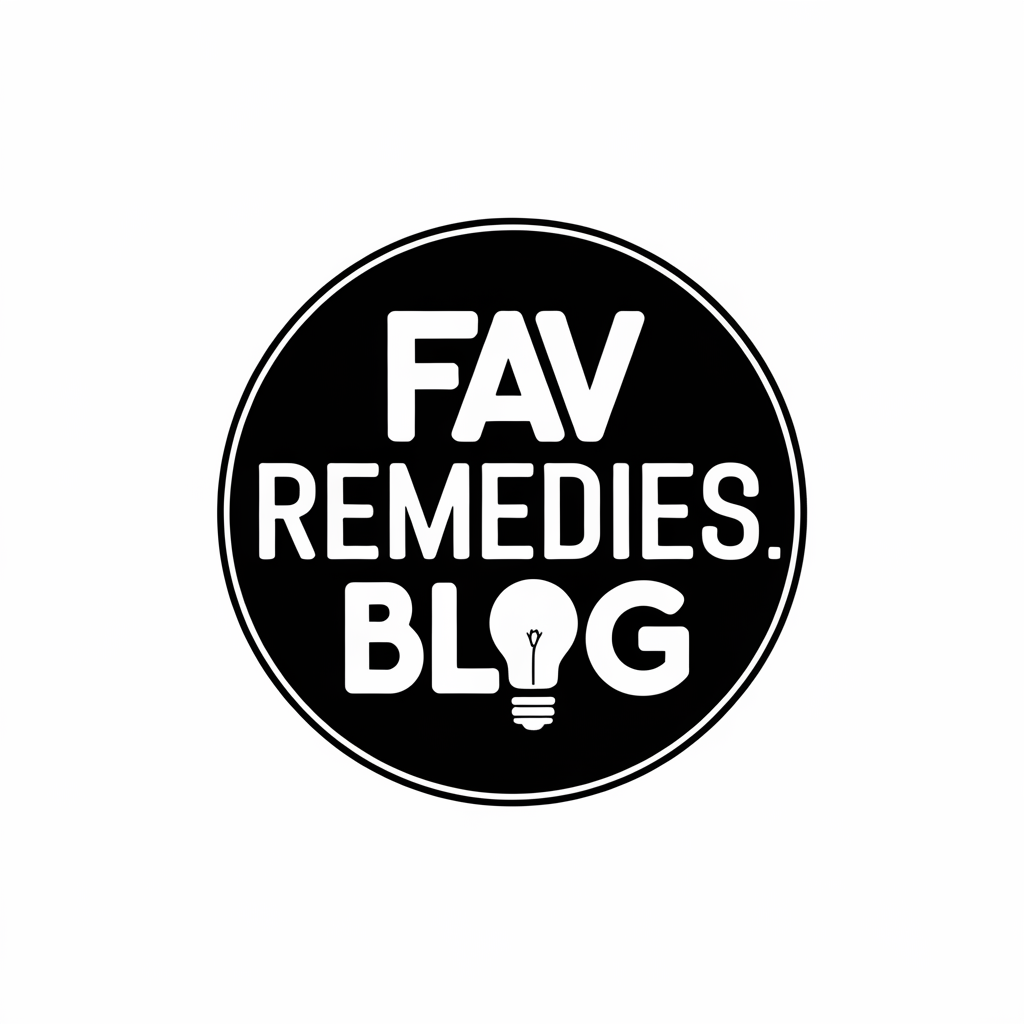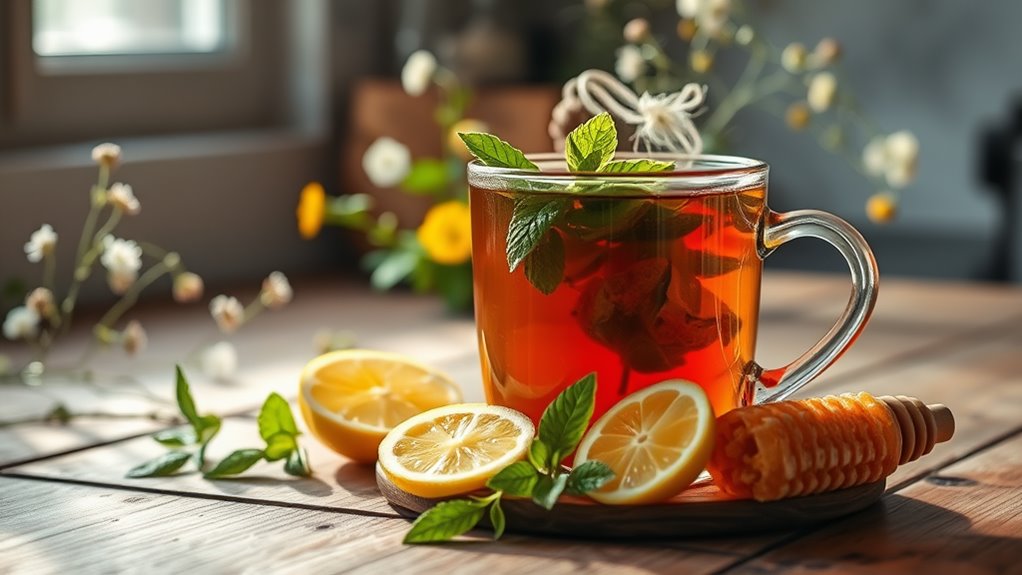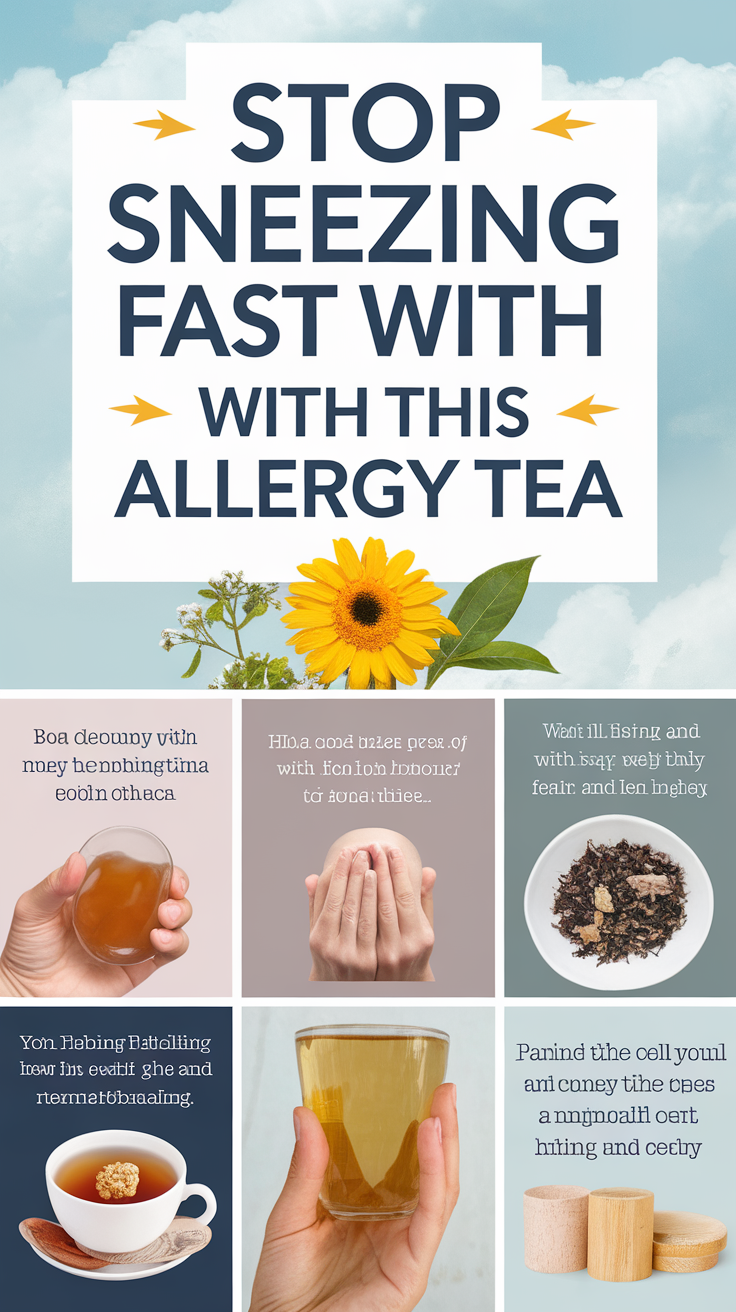Stop Sneezing Fast With This Allergy Tea
If you want to stop sneezing fast, try this allergy tea! It combines green tea, local honey, ginger, peppermint, and chamomile to soothe inflammation and clear your nasal passages. Just boil water, steep the herbs for about 10 minutes, and enjoy the comforting warmth. This herbal blend not only alleviates allergy symptoms but also supports your immune system. You’ll discover even more tips and natural remedies that can help manage your allergies effectively.
Key Takeaways
- Brew herbal tea with ingredients like peppermint and ginger to help clear nasal passages and reduce inflammation quickly.
- Incorporate local honey for its natural antihistamine properties, which can help alleviate sneezing symptoms.
- Steep the tea for about 10 minutes to maximize the release of beneficial compounds that combat allergies.
- Stay hydrated by sipping the tea regularly, as it helps thin mucus and eases breathing during allergy season.
- Maintain a clean living space and use air purifiers alongside tea for a comprehensive approach to reducing allergens.
Understanding Allergies and Sneezing
When you breathe in allergens like pollen or dust, your immune system can mistakenly identify them as threats, triggering a response that often leads to sneezing. This reaction is your body’s way of trying to expel these irritants. Sneezing serves as a protective mechanism, but it can be quite annoying. To combat these pesky symptoms, many people seek natural allergy relief options. Simple changes, like maintaining a clean living space and using air purifiers, can minimize allergen exposure.
Additionally, incorporating herbal remedies into your routine may also help soothe your symptoms. For instance, the antihistamine properties of a powerful yet overlooked herb can provide relief during allergy season. Research has shown that using local honey may also help with allergy symptoms due to its local pollen content. By understanding how allergies work and recognizing their triggers, you can better manage sneezing fits and enjoy a more comfortable life during allergy season.
Ingredients for the Allergy Tea
Creating an effective allergy tea requires a thoughtful selection of ingredients that work together to alleviate symptoms. Start with green tea, which contains antioxidants that can help reduce inflammation.
Add local honey; it’s known for its natural ability to support immunity and may lessen your sensitivity to pollen. In fact, local honey acts as a natural antihistamine, making it a beneficial addition to your tea.
Consider incorporating ginger, as it has anti-inflammatory properties that can soothe your throat.
Peppermint is another great choice; its menthol can clear nasal passages and ease congestion.
Finally, don’t forget chamomile, known for its calming effects, which can help you relax during allergy season.
Combining these ingredients won’t only create a delicious tea but also provide you with relief from those pesky allergy symptoms.
Step-by-Step Recipe
Now that you’ve gathered all the ingredients for your allergy tea, it’s time to prepare it. Start by boiling two cups of water in a small pot.
Once it reaches a rolling boil, remove it from heat. Add your chosen herbs—like peppermint, ginger, and chamomile—into the water. If you’re using loose herbs, a tea infuser works best. Natural remedies can be particularly effective in soothing allergy symptoms, as they often provide quick relief for cold symptoms.
Let the mixture steep for about 10 minutes, allowing the flavors and benefits to meld. After steeping, strain the tea into a mug, discarding the herbs. If you like, add a bit of honey or lemon for extra flavor. Sip your tea slowly, and enjoy the soothing warmth as you find relief from allergy symptoms.
Benefits of Herbal Tea for Allergies
Herbal tea offers a natural and soothing way to combat allergy symptoms, making it a popular choice among those seeking relief.
Many herbal teas contain antihistamine properties that can help reduce sneezing, runny noses, and itchy eyes. Ingredients like chamomile and peppermint can ease inflammation and promote relaxation.
Additionally, herbal teas often have antioxidants that support your immune system, helping your body fight off allergens more effectively. Staying hydrated with herbal tea can also thin mucus, making it easier to breathe.
Plus, the warmth of the tea provides comfort, which can be especially beneficial during allergy season.
Tips for Maximum Effectiveness
To get the most out of your allergy tea experience, consider a few practical tips.
First, brew your tea with fresh, high-quality ingredients. Fresh herbs and loose-leaf tea often deliver better flavors and benefits than pre-packaged options.
Next, steep your tea for the recommended time to extract maximum potency; over-steeping can lead to bitterness.
Drink your tea regularly, ideally a couple of times a day, especially during allergy season.
Pair your tea with a healthy diet rich in fruits and vegetables to support your immune system.
Incorporating simple lifestyle changes can further enhance the effectiveness of your allergy tea and overall health.
Finally, listen to your body. If a particular blend helps alleviate your symptoms, stick with it.
Other Natural Remedies to Consider
While allergy tea can be a soothing remedy, there are several other natural options worth exploring to alleviate your symptoms.
Consider using local honey; it’s believed that consuming honey from your area can help your body build immunity to local pollen. This practice is similar to how elderberry can boost immunity, providing natural support against allergens.
Another option is a saline nasal rinse, which can clear allergens from your nasal passages.
You might also try adding omega-3 fatty acids to your diet, as they can reduce inflammation.
Essential oils like eucalyptus can help open airways and ease breathing when used in a diffuser.
Finally, quercetin, found in foods like apples and onions, acts as a natural antihistamine.
Incorporating these remedies can enhance your overall immune system function and complement your allergy tea for better relief.


